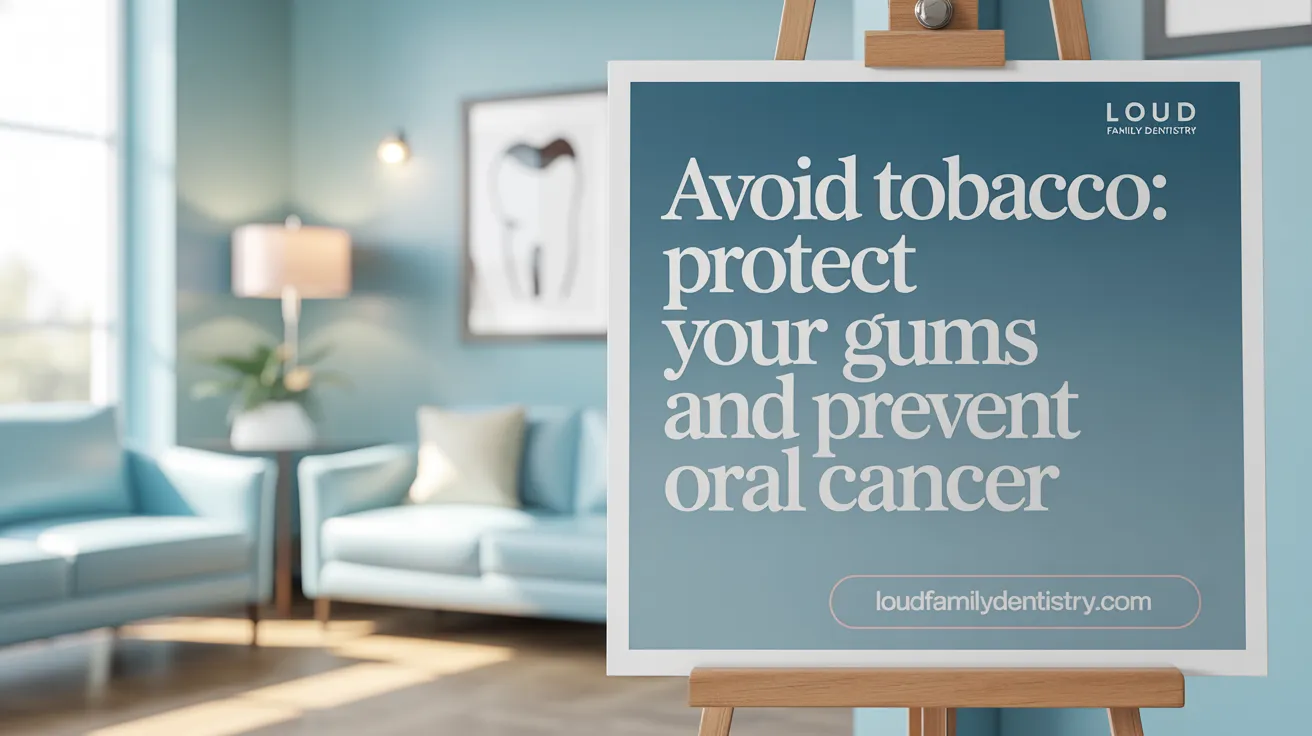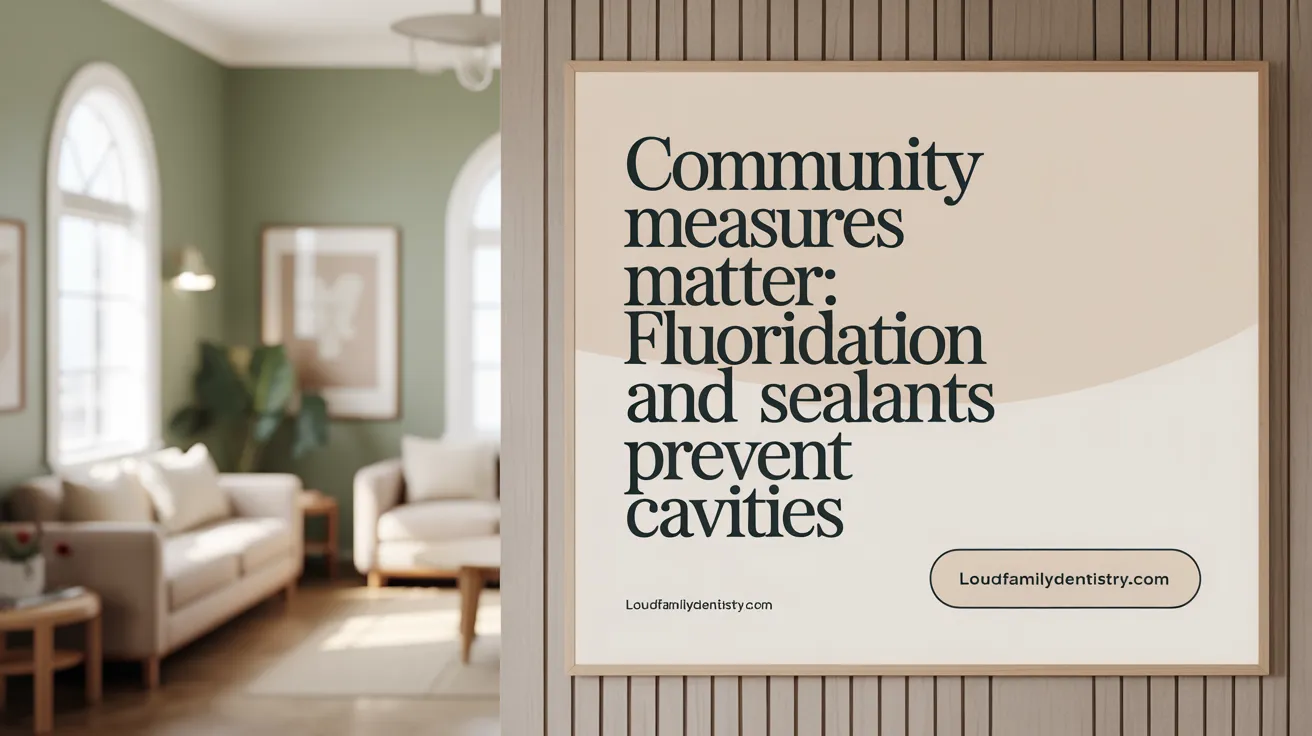Building a Foundation for Lifelong Oral Health
Early Dental Care Sets the Stage
Starting dental visits early, ideally by a child’s first birthday or within six months of the first tooth eruption, is crucial. Early visits help establish comfort with dental care and allow providers to spot and prevent problems before they develop.
Creating Healthy Habits in Childhood
Teaching children to brush twice daily with fluoride toothpaste and to floss once their teeth touch builds the habits essential for preventing cavities and gum disease. Supervision during brushing until a child can reliably rinse and spit ensures effective cleaning.
Nutrition's Role in Dental Development
A balanced diet rich in fruits, vegetables, dairy, calcium, phosphorus, and vitamins supports strong teeth and healthy gums. Limiting sugary snacks and drinks reduces the risk of decay and helps maintain oral health.
Together, these early practices offer a strong foundation to protect teeth through adolescence and adulthood, supporting lifelong oral wellness.
Daily Oral Hygiene: The Cornerstone of Preventive Dental Care

How Should I Brush My Teeth Correctly and How Often?
Brushing teeth twice a day, ideally for two minutes each time, is essential for removing dental plaque and preventing cavities and gum disease. Use a soft-bristled toothbrush angled at 45 degrees toward the gum line, moving in gentle circular motions rather than harsh scrubbing. Replace your toothbrush every 3 to 4 months or sooner if the bristles are worn down. Electric toothbrushes can be helpful, especially for people with limited manual dexterity.
Why Is Using Fluoride Toothpaste Important?
Fluoride toothpaste benefits strengthen enamel, making teeth more resistant to acid attacks from bacteria and sugars. It reduces tooth decay risk and is especially beneficial for those with dry mouth. Use toothpaste containing at least 1,350 ppm fluoride for adults and slightly lower amounts for young children. Avoid rinsing immediately after brushing to allow fluoride to remain on teeth longer.
What Role Do Flossing and Tongue Cleaning Play in Oral Care?
Daily flossing or using interdental brushes removes plaque and food particles from between teeth where a toothbrush cannot reach, reducing the risk of gum inflammation and tooth decay. Cleaning the tongue with a toothbrush or a tongue scraper helps reduce bacteria that cause bad breath and supports overall oral hygiene.
How Can Antibacterial Mouthwash Support My Oral Health?
Using an alcohol-free antibacterial mouthwash daily can help control plaque and reduce bacteria in the mouth, especially for people prone to gum disease. Mouthwash is a helpful addition, but it should not replace brushing and flossing.
Why Is It Important to Avoid Tobacco Products?
Tobacco use is a major risk factor for gum disease, oral cancer, and impaired healing in the mouth. Avoiding tobacco promotes healthier gums, lowers cancer risk, and supports the success of dental treatments. Quitting smoking improves not only oral health but overall well-being.
Maintaining this daily oral hygiene routine—brushing twice with fluoride toothpaste, flossing, tongue cleaning, using antibacterial mouthwash, and avoiding tobacco—forms the foundation for a lifetime of healthy teeth and gums. Regular dental check-ups remain essential for early detection and personalized care.
Regular Dental Visits: Early Detection and Professional Care

Recommended Frequency of Dental Checkups
Dental checkups are generally recommended every six months to maintain good oral hygiene practices and facilitate early detection of any dental issues. However, individuals at higher risk for cavities or gum disease may need more frequent dental checkups for cavity-prone individuals for closer monitoring and care.
Professional Cleanings and Dental X-Rays
During dental visits, professional dental cleanings play a vital role by removing plaque, tartar, and stains that daily brushing and flossing may miss. Dental X-rays complement exams by revealing hidden problems such as cavities between teeth or infections below the gum line, enabling prompt treatment.
Oral Cancer Screenings and Early Intervention
Regular dental appointments include oral cancer screening importance, which are crucial as the risk increases with age. Early detection through painless and quick examinations greatly improves treatment success and outcomes.
Tailoring Appointments to Patient Risk
Dental care providers adjust the frequency and focus of checkups depending on individual risk factors like chronic diseases, dry mouth, or history of gum disease. This personalized approach ensures preventive oral care tips is both effective and timely.
Importance of Communication About Medical Conditions
Patients should inform dental professionals about any existing health conditions and medications, as these can influence oral health and care plans. Open communication helps dentists provide safer and more precise treatments.
Loud Family Dental exemplifies these professional care standards by ensuring highly qualified staff, rigorous hygiene protocols, and personalized patient care. Their commitment to excellence and community focus makes them a trusted dental care in Shreveport, Louisiana provider in Shreveport.
Nutrition and Lifestyle: Supporting Oral Health Through Choice
How does diet impact dental health?
What we eat greatly influences our dental health. A balanced diet rich in essential nutrients like calcium, phosphorus, and vitamins A and C supports the strength and repair of teeth and gums. These nutrients help maintain the structural integrity of teeth and promote Healthy teeth and gums, which acts as the foundation for overall oral health. See more about Oral health tips for adults.
Why limit sugar and acidic foods?
Limiting sugary and acidic foods is crucial because sugars feed harmful bacteria in the mouth that produce acids, leading to tooth decay and erosion of enamel. Acidic drinks and snacks further weaken the enamel, increasing sensitivity and susceptibility to cavities. Choosing healthier snacks and beverages can help prevent plaque buildup and maintain a strong, cavity-resistant smile. Learn about Diet and oral health.
What benefits do calcium, phosphorus, and vitamins provide?
Calcium and phosphorus are minerals that strengthen tooth enamel and bones, whereas vitamins like A and C contribute to healthy gum tissue and saliva production. A diet incorporating dairy, leafy greens, fruits, and vegetables ensures your mouth receives these vital nutrients. These nutrients also aid in fighting infections and promoting proper healing in gum tissues. For more information, visit Healthy teeth and gums.
How do hydration and saliva affect oral health?
Adequate hydration supports saliva production, which plays a vital role in washing away food particles and neutralizing harmful acids in the mouth. Saliva also contains minerals that help remineralize tooth enamel. Stimulating saliva flow by drinking water regularly and chewing sugarless gum can protect against Dry mouth and oral health, a common risk factor for cavities and infections, especially in older adults and those taking certain medications. Read about Dry mouth and oral health.
What are the effects of tobacco and alcohol on oral health?
Tobacco and alcohol effects on oral cancer risk dramatically increases the risk of gum disease, oral cancers, and delays healing after dental procedures. Alcohol can dry out the mouth and contribute to gum inflammation and tooth decay. Limiting or avoiding tobacco and excessive alcohol intake is one of the most effective lifestyle choices for preserving oral health and overall health and overall wellbeing. Learn about Avoiding tobacco and alcohol for oral health.
By embracing a lifestyle that focuses on healthy nutrition, adequate hydration, and avoiding harmful substances, you can significantly support your oral health and overall health and maintain a confident smile for years to come.
Special Considerations for Adults and Seniors in Oral Care
How can adults and seniors manage dry mouth and medication effects?
Dry mouth is a common issue among adults and especially seniors, often caused by medications or health conditions. Managing this involves staying well-hydrated by drinking plenty of water and avoiding alcohol and caffeine, which can worsen dryness. Using fluoride toothpaste benefits helps protect teeth from decay linked to reduced saliva. Artificial saliva products or sugarless gum can also aid in keeping the mouth moist.
What oral health challenges increase with aging?
As adults age, they face several oral health challenges including decreased saliva production, gum recession, worn enamel, and an increased risk of cavities and gum disease. These conditions can lead to tooth loss if not addressed. Physical or cognitive limitations may make personal oral hygiene more difficult, which means seniors need tailored advice and possibly the help of caregivers to maintain good oral hygiene practices.
Why is denture care and caregiver assistance important?
Many seniors use dentures to replace missing teeth, but these require proper daily cleaning and periodic adjustment for comfort and to prevent infections. Seniors with physical or cognitive impairments often need caregiver assistance with oral hygiene tasks. Caregivers should follow specific oral care for older adults with dementia tips to ensure seniors maintain healthy gums, clean dentures, and effectively prevent plaque buildup.
How does oral health relate to systemic diseases in adults?
Poor oral health is linked to serious systemic diseases such as cardiovascular disease, diabetes, pneumonia, and pregnancy complications. For example, gum disease can complicate blood sugar control in diabetics and may increase the risk of stroke or heart disease. Maintaining good oral hygiene can help manage chronic conditions and improve overall health outcomes.
Why are oral cancer risk and screenings important for adults?
Oral cancer risk increases with age, particularly after 40, and is also elevated by tobacco use and heavy alcohol consumption. Regular dental checkups include painless oral cancer screening, essential for early detection and better treatment outcomes. Adults should maintain annual dental visits to monitor for signs of oral cancer and other oral health issues, making these screenings a vital part of preventive care.
Community Prevention Initiatives: Fluoride and Sealants for Long-Term Protection

What are the benefits of water fluoridation?
Community water fluoridation is recognized as a safe and effective way to prevent tooth decay by strengthening tooth enamel across all age groups. It reduces cavities significantly and has been linked to saving billions in dental treatment costs nationwide. Continuous access to fluoridated water offers ongoing protection, reducing the need for restorative dental care and supporting overall oral health.
How effective are dental sealants for children?
Dental sealants are clear coatings applied to the chewing surfaces of children's permanent molars. They can reduce the risk of cavities by about 80%, especially when combined with good oral hygiene and regular dental visits. Sealants protect hard-to-clean areas on teeth, preventing decay before it starts, making them a crucial preventive tool in pediatric dental care.
What is the economic and health impact of these preventive measures?
Preventive strategies like water fluoridation and sealants save communities significant amounts in dental treatment costs—approximately $6.5 billion from fluoridation alone and up to $300 million from providing sealants to low-income children. These measures reduce emergency dental visits and chronic dental conditions, fostering better oral health and contributing to overall wellness.
How do access to affordable care and community programs support oral health?
Many Americans live in areas with limited dental provider availability, which leads to worse oral health outcomes. Community programs like school dental sealant initiatives and workforce training enhance access to care. Affordable options such as dental schools and community clinics also help lower financial barriers, encouraging regular preventive dental visits.
Why are early dental visits important for children?
Establishing a dental home by age one or within six months of the first tooth eruption helps normalize routine dental care and prevents early childhood tooth decay. Early dental visits include fluoride treatments and sealant applications, fostering healthy habits that last a lifetime and supporting proper development of primary and permanent teeth.
Comprehensive Care Experience at Loud Family Dental
What comprehensive dental services does Loud Family Dental provide for patients of all ages?
Loud Family Dental offers a full suite of dental services designed to meet the needs of patients from children to seniors. These services include preventive dental care benefits like regular cleanings and fluoride treatments, restorative options such as crowns and dental implants, cosmetic procedures, and emergency dental care. The clinic focuses on providing care that is both professional and gentle, ensuring patients feel comfortable and confident in their treatments. Collaboration with community programs allows Loud Family Dental to support Family Dentistry Tips, complementing local efforts to improve Access to Affordable Healthy Foods.
How does Loud Family Dental ensure comfort for its patients during dental treatments?
Patient comfort is a top priority at Loud Family Dental. The clinic creates a soothing environment using calming colors and soft background music to ease anxiety. Modern technologies like laser dentistry and digital impressions make treatments less invasive and more comfortable. To further enhance relaxation, patients can enjoy blankets, neck pillows, and entertainment during appointments. Staff members use empathetic communication to explain procedures clearly and build trust. Efficient scheduling and attentive follow-up care help minimize wait times and manage any post-treatment discomfort, ensuring a positive experience from start to finish.
What professional care standards does Loud Family Dental uphold in its dental practice?
Loud Family Dental is dedicated to adhering to the highest professional standards. All dental professionals receive continual education to stay updated on the latest dental technologies and best practices. The clinic enforces strict hygiene and sterilization protocols to protect patient health and prevent infections. Personalized care is emphasized, with treatments tailored to each patient's unique dental needs and comfort. These rigorous standards affirm Loud Family Dental's role as a trusted and inclusive dental care provider in the Oral hygiene for diabetes patients.
Maintaining Healthy Teeth for Life: Empowerment Through Prevention and Professional Care
Key Preventive Practices for Lasting Oral Health
Maintaining healthy teeth throughout life begins with simple, daily habits. Brushing twice daily using fluoride toothpaste effectively removes plaque and strengthens tooth enamel, shielding against decay. Flossing once daily is essential for cleaning between teeth where brushes cannot reach, reducing gum disease risk. Incorporating gentle tongue brushing helps decrease bacteria that cause bad breath and oral infections. Additionally, a balanced diet low in sugary foods and drinks supports strong teeth and gums.
Importance of Ongoing Dental Care
Regular dental checkups — ideally every six months — are crucial for early detection and treatment of oral health issues. Professional cleanings remove plaque buildup that daily care might miss, preserving gum health and preventing tooth loss. These visits also provide opportunities for oral cancer screenings and personalized advice, especially for individuals with risk factors such as dry mouth or chronic conditions like diabetes.
Utilizing Professional Dental Services
Accessing professional dental care contributes greatly to preserving natural teeth and overall well-being. Local providers, such as Loud Family Dental, offer comprehensive services tailored to individual needs, ensuring management of dental health challenges and reinforcing preventive strategies. Engaging with dental professionals empowers patients to maintain a confident, healthy smile across all ages.
